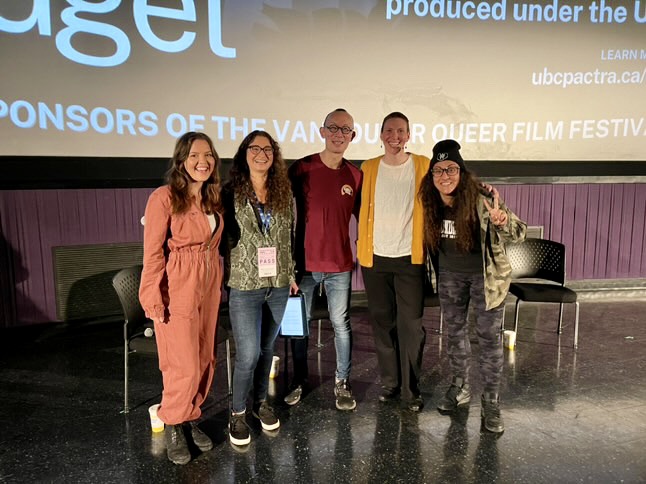How to Maximize Your Impact as a Filmmaker on Industry Panels: Insights from the Vancouver Queer Film Festival
- September 25, 2024

As a filmmaker, sharing your journey on an industry panel is a powerful way to connect with your peers, build your reputation, and give back to the community. Recently, I had the opportunity to speak on a panel at the Vancouver Queer Film Festival about my transition from working as a producer and creative executive to becoming a director. For anyone looking to appear on a panel, I’ve put together some key takeaways that can help you make the most of the experience—whether you’re just starting out or seeking to level up your directing career.
Reflecting on Your Journey: Be Specific
The panel I participated in focused on career transitions, so preparation involved looking back at my own personal and professional growth over the last five years. I thought about the pivotal moments—how I moved from a creative executive role to becoming a director for hire in television movies, and eventually, directing my own feature film. What I wished I had known earlier played a big part in the insights I wanted to share.
For up-and-coming filmmakers, panels are a chance to be specific about your journey. I’m passionate about working with actors to create grounded, authentic performances that drive the narrative—something I highlighted because it’s been key to my success as a director. Sharing those unique elements of your process can provide real value to the audience. Think about what makes your approach distinct. Maybe it’s how you work with actors, your collaborative style, or how you’ve navigated industry challenges. Don’t shy away from revealing the nuances of what you’ve learned along the way.
Managing Nerves by Focusing on the Audience
Even with a lot of public speaking experience, I still get nervous before a panel. What helps me manage those pre-panel jitters is remembering that the experience isn’t about me—it’s about the audience. I’ve spent a lot of time peer-mentoring other filmmakers, and I see panels as an extension of that. They’re an opportunity to share knowledge, not to be in the spotlight for the sake of it.
If you’re someone who feels anxious about public speaking, shift your focus from yourself to the people in the audience. Consider it a group mentoring session. Your goal is to offer them actionable insights, not to be perfect. Thinking this way can calm your nerves and help you perform at your best.
Connecting with Fellow Panelists: A Chance to Learn and Grow
One of the most rewarding parts of the Vancouver Queer Film Festival panel was connecting with the other filmmakers on stage. Hearing how others approach their journey was a reminder that there’s no one-size-fits-all path to success.
For filmmakers collaboration is at the heart of what we do, and panels and other industry events can be an extension of that. These events are a great opportunity to learn from other filmmakers. It’s fascinating to hear how other directors handle their careers, and sometimes those conversations can spark new ideas or even future collaborations.
Elevating Your Profile: The Power of Public Exposure
Participating in a panel can position you as an expert in your field. The event promotion itself puts your name in front of industry decision-makers, and that visibility can lead to opportunities down the line. For me, panels have been a way to demonstrate my leadership and vision, particularly as a director who is passionate about working with actors to craft emotionally driven stories. Whether you’re looking to transition into directing or seeking new collaborators, panels can raise your profile and help you connect with people who may play a role in your future projects.
Actionable Insights: What Resonates with the Audience
After the panel, I received feedback from the audience that my specific, actionable advice was the most helpful. I focused on sharing real-world strategies that had worked for me, and specific information on the pre-production process, as well as some tips about pitching to producers and networks.
When preparing for a panel, think about what actionable insights you can offer. For instance, I talked about the importance of collaborating deeply with every department and how crucial it is to harness the creativity of your crew to elevate the project. This is something that has served me well, whether in television movies or my feature film, and I knew it could benefit other filmmakers.
Public Speaking: Practise Before You Step Up
One recommendation I always make is to practise public speaking if you don’t have much experience. In my directing work, especially when working with actors, communication is everything, and the same applies on a panel. If you’re new to speaking in front of an audience, consider professional media training, join a group like Toastmasters, or even just listen to podcasts or recorded panels to study what makes a speaker engaging. The better you can communicate your ideas, the more impactful your presence will be.
Final Thoughts
Appearing on a panel is more than just an opportunity to share your story—it’s a chance to position yourself as a leader in the industry. For filmmakers, especially those of us who are passionate about character-driven storytelling, panels provide a platform to show the world what drives your creative vision and the insights you’ve gained along the way. With thoughtful preparation, an audience-focused mindset, and a willingness to connect with your peers, you can make a lasting impact both on and off the stage.